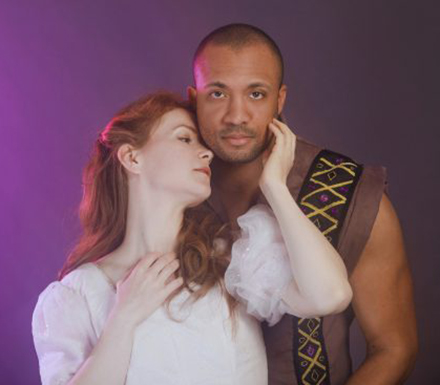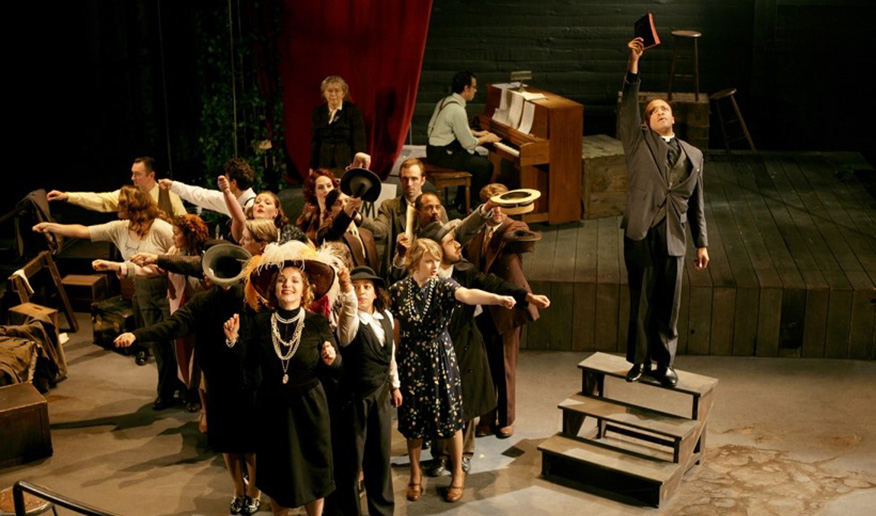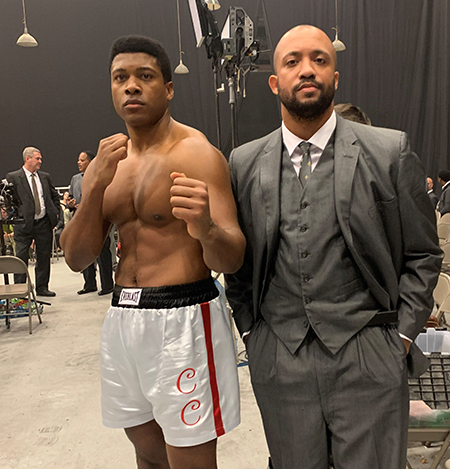
In Regina King’s 2020 film “One Night in Miami,” Muhammad Ali celebrates with close friends Malcolm X, Jim Brown, and Sam Cooke after winning a championship fight. The actors in the film faced a daunting challenge: to embody famous individuals, including their speech patterns, without veering into parody. Fortunately, UW Arts & Sciences alumnus Tré Cotten (MFA, 2017, Acting) was able to help.
Cotten, an actor, director, and acting/voice/dialect coach, worked with actors Eli Goree and Leslie Odom, Jr. to capture the essence of Ali and Cooke in the film. The project showcased Cotten’s skills as a dialect coach and led to more coaching opportunities, including the current Broadway revival of the play “Purlie Victorious” by Ossie Davis. In 2020, Cotten was featured in the New York Times for his dialect work.
It’s been a wild ride for North Carolina-born Cotten, whose only focus growing up was basketball.
“I’m in some of the most influential spaces now, where they’re looking to what I’m doing to help tell a story,” he says. “Given where I started, that nuts.”
Intrigued by the Stage
Cotten was first introduced to acting during his undergraduate years at University of North Carolina – Wilmington (UNCW). The television show “One Tree Hill” was filming nearby and sought extras for basketball scenes. Cotten signed up and was so taken with the experience that he then took “any job you could probably think of” on the show’s set.

Soon after, a friend invited Cotten to audition for a musical in downtown Wilmington. “She asked me several times, saying they didn’t have many guys,” Cotten recalls. “I didn’t sing, I didn’t act, I didn’t dance. I knew nothing.” Cotten finally agreed to audition — and got a part.
That led to other roles in community theater and a switch to a drama major at UNCW. Cotten found mentors among theater professionals in the Wilmington area, including UNCW alum Carl Kennedy, who was also an alumnus of the UW’s Professional Actor Training Program (MFA, Acting, 2010).
Kennedy would become a significant figure in Cotten’s life, opening important doors and showing him what was possible for a Black actor. When Cotten visited Seattle to check out the UW’s graduate acting program, Kennedy contacted the UW School of Drama to see if someone could talk with him. That’s when Cotten met Valerie Curtis Newton, professor of directing and acting.
“She was the first person to call me ‘Black gold,’” he recalls. “In the Black community, when we refer to someone as Black gold, it’s saying that we see all that you’re worth, even though it’s been unseen. To be empowered in that way by Valerie really inspired me. Also, as a Black and Native artist, I liked that there were people in the School who looked like me. But what really sold me on the UW was Valerie telling me, ‘We want to help artists help change the world.’”

Cotten enrolled in the Professional Actor Training Program and performed in UW School of Drama (SoD) productions as well as plays at Seattle Repertory Theater, ACT Theater, and the Virginia Shakespeare Festival. As part of his graduate training, he took voice and dialect courses with SoD faculty Judith Shahn and Scott Hafso, which would prove invaluable for his future career.
After earning his MFA, Cotten performed in Vancouver, BC, often working with international artists who sought his help to sound more North American. Around that time he met Eli Goree, an actor seeking a Louisville, Kentucky sound for a role as Muhammad Ali in an upcoming play. As a Black southerner, Cotten was happy to help. And so began his career as a dialect coach.
An Unexpected Path
Dialect coaching requires understanding distinctive voice attributes but also understanding the actor being coached. “Each actor is different,” Cotten says. “You’re working with that raw material of what the actor’s got to start with and then it’s a journey between both of us. That’s the beautiful part about this work. It can’t be done alone.”

While Cotten was working with Goree, auditions for “One Night in Miami” were announced, including for the role of Muhammad Ali. Goree got the part, and Cotten was hired to work with him — and later Leslie Odom, Jr., who played Sam Cooke — to develop the distinctive voice of their characters. Other coaching opportunities followed. At that point, Cotten had to decide whether to prioritize coaching over acting.
“My work as an actor was thriving,” he says. “I was about to hop on tour as an actor for ‘Kim’s Convenience,’ a show that had great success in Vancouver. I saw a lot of choices for myself. I had to ask myself what kind of legacy I wanted to leave. I chose the cultural legacy. Coaching other actors became my calling.”
Though Cotten is open to coaching actors in any dialect, the New York Times story presented him as a dialect coach for ‘Black sound.’” He’s okay with that. He’s seen performers miss the mark often enough in capturing underrepresented voices that he is committed to working in that space.
“I like to get as specific as I can with representing a community because the community deserves that representation,” Cotten says. “The way we speak represents our family, it represents where we’ve been, where we want to go. It represents our ancestors, and it represents the house we grew up in. It represents so much.”
The way we speak represents our family, it represents where we’ve been, where we want to go. It represents our ancestors, and it represents the house we grew up in. It represents so much.
Dialect coaching takes up much of Cotten’s time, but he’s also been part of videogame projects and is developing new work for stage and screen. Through the Human Mortals Project, an outreach program he founded, an ensemble of artists combines Shakespeare with jazz and hip hop to educate and foster inclusivity in the performing arts in an engaging way.
All of this has meant even less time for acting, but Cotten is happy with the path he’s taken.
“I’m aware I’m in a field where there aren’t many people who look like me,” he says. “The voice makes up so much of us, and as people of color, that is often the first thing that is taken away. So to have a career to help people realize not only their voice but to represent unrepresented voices? I’ll take that.”
More Stories

Finding Love at the UW
They met and fell in love as UW students. Here, 10 alumni couples share how they met, their favorite spots on campus, and what the UW still means to them.

Bringing Music to Life Through Audio Engineering
UW School of Music alum Andrea Roberts, an audio engineer, has worked with recording artists in a wide range of genres — including Beyoncé.

A Love of Classics and Ballroom
Michael Seguin studied Classics at the UW and now owns Baltimore's Mobtown Ballroom. The two interests, he says, are more connected than they might seem.
